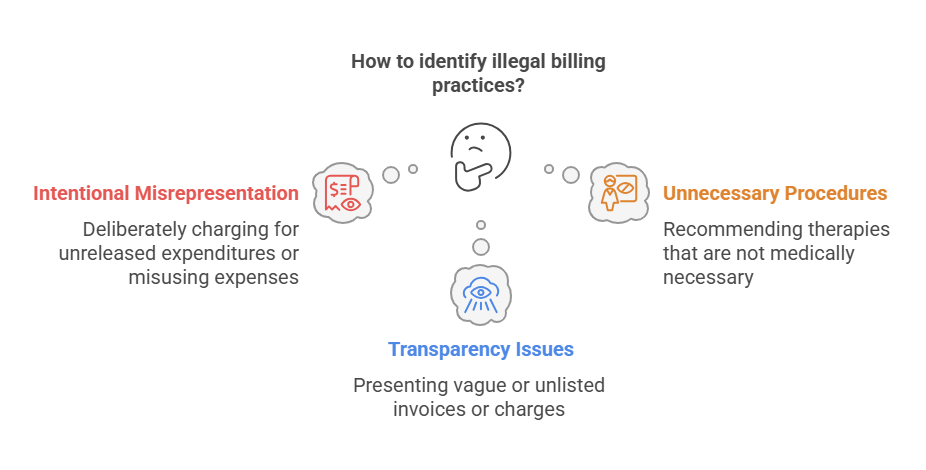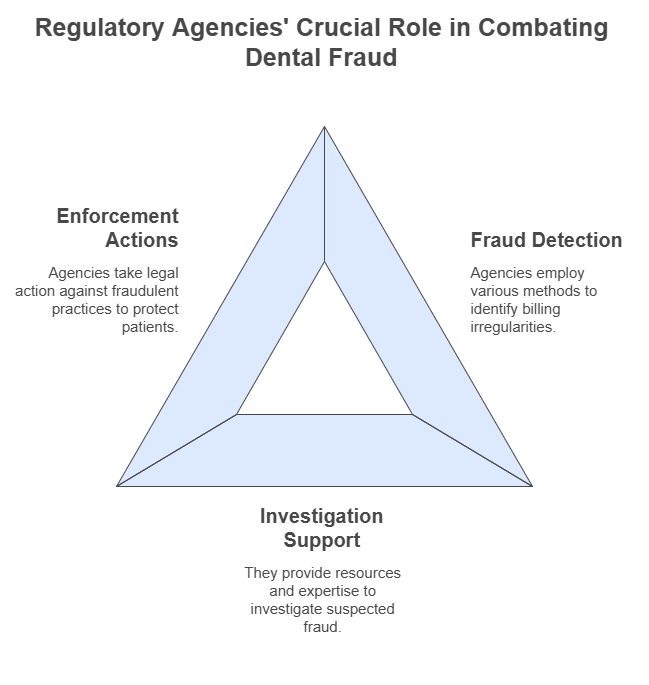A Guide to Identifying, Preventing, and Protecting Yourself from Illegal Dental Billing Fraud
Maintaining your health requires oral hygiene, but handling the complexities of dental bills may be rather difficult! Regretfully, not all dentist offices adhere to standards that prioritize the needs of their patients, which results in unethical and unlawful invoicing that costs both patients and insurance companies money. The procedures to make sure you are treated properly and morally and to guard against being misled.
In this article, we’ll go into great detail about illegal dental billing practices, including how they might affect you and how to spot and avoid them. By the end, you will understand how to prevent false billing and promote transparency in dental care.
What Kinds of Dental Billing Fraud Are Frequently Employed?
When dental professionals bill their clients or insurance companies for treatments that were never provided, they are engaging in unethical or fraudulent dental billing practices. These actions can have severe consequences, whether deliberate fraud or unintentional mistakes.

Key Elements of Illegal Billing:
- Intentional Misrepresentation: Deliberately charging for unreleased expenditures or misusing expenses is known as intentional misrepresentation.
- Unnecessary Procedures: Recommending therapies that are not medically necessary is known as an unnecessary procedure.
- Transparency Issues: Presenting vague or unlisted invoices or charges
How to Spot Dental Fraud: Common Forms of False Billing
Some of the most prevalent illegal billing methods in dentistry are listed below, along with warning signs to look out for:
Upcoding:
What It Is: Billing for a more expensive procedure than was performed.
Example: After basic filling, a dentist invoices the insurance company for a crown. The American Dental Association (ADA) provides coding guidelines to standardize billing practices.
Red Flag: You received just basic care, but the bill details a complex procedure.
Disentangling:
What It Is: Dividing processes that need to be billed under a single code.
Example: Billing separately for the anesthetic, X-ray, procedure, and other steps involved in a root canal.
Red Flag: Unbundling in which just one therapy has to be listed
Phantom Billing:
What It Is: Billing for treatments or services that were never carried out. Example: Billing for cleanings or X-rays that were never completed.
Red Flag: Services you don’t recall obtaining but that show up on your account.
Permitting the execution of needless procedures:
What It Is: Superfluous therapy suggestions.
Example: They may suggest crowns or fillings when, in reality, very modest repair is needed.
Red flag: A treatment plan that is too harsh or comprehensive.
Deductible Waivers or Co-Pay:
What It Is: To attract more consumers, patient treatments are being provided in violation of the code.
Example: We significantly overcharge insurance companies to “offer” “free” services.
Red Flag: A dentist who doesn’t charge you a co-pay or deductible.
The practice of double billing:
What it is: The process of billing the insurance company and the patient for the same service.
Example: Someone bills for services they never rendered.
Red Flag: Duplicate costs are listed on the bank account or insurance policy.
The Effects of Illegal Dental Billing
The health care system, dental professionals, and patients are all affected by illegal billing methods.
Regarding Patients:
Financial strain: The significant overbilling permits unforeseen out-of-pocket costs. Emotional Stress: Dealing with fraudulent invoices, in particular, may be extremely stressful and draining.
Health risk: Needless procedures can be harmful to oral health.
Regarding the Medical System:
Increased Costs: The cost of insurance for everyone goes up when fraudulent claims occur.
Loss of Trust: Patients may start to lose faith in the medical system and dentist’s office.
Regarding Dentists:
Legal consequences: Fraudulent dentists may be subject to fines, license suspensions, or possibly criminal prosecution.
Image Damage: A dentist’s professional reputation can be ruined by excessive fraudulent activities.
How to Spot Dental Invoice Fraud: A Step-by-Step Guide
However, identifying the warning signs is the greatest defense against being accused of fraudulent billing. Here’s what to search for:
Give your bill a thorough look.
- Keep an eye out for unclear descriptions, duplicate billing, or unusual charges.
- Compare the charge to any treatment notes or records you may have.
Request Itemized Statements
- Request a breakdown of all expenses.
- Verify that each fee corresponds to the services you received.
Learn what your insurance covers
- Recognize the procedures that are covered and the amount that you will need to pay out of pocket.
- Examine your insurance provider’s Explanation of Benefits (EOB) statement.
Compare the Plans of Treatment
- Get another perspective if a dentist recommends extensive or expensive procedures.
- Simple examinations are common features of reasonable treatment programs.
Inspect for consistency
- Make sure that the services you are being invoiced for correspond to the care you received.
- Verify your insurance statement and bill for any differences.
Preventing Dental Billing Fraud: How to Guard Yourself
Regularly auditing your billing processes like our Revenue Cycle Management (RCM) services can prevent costly errors.Fortunately, there are practical steps you may take to safeguard yourself from unlawful invoicing practices:
Make Inquiries
- You can request an explanation of costs from the billing staff or your dentist.
- If something on your bill doesn’t make sense, ask for an explanation.
Check Claims for Insurance
- Check your bill against the EOB statement.
- Get in touch with your insurance provider if there are any differences.
Maintain Documents
- Maintain copies of all your correspondence with your dentist, including bills and receipts.
- Recording discussions regarding treatments and expenses is a smart idea.
Report Any Questionable Activities
- Speak with the state dentistry board or your insurance provider if you believe there has been fraud.
- File a grievance with the appropriate regulatory body.
Select Reputable Suppliers
- Examine the qualifications of dentists and read patient testimonials before scheduling an appointment.
- Look for physicians who prioritize patient education and openness.
Reporting Dental Fraud: The Role of Law Enforcement
In the battle against dental billing fraud, regulatory agencies play a crucial role. Insurance companies often use tools similar to our medical billing services to detect fraudulent claims. How they assist is as follows:
Boards for Dentistry:
- In charge of the ethics and conduct standards for dentists.
- Respond to grievances and, if necessary, enforce discipline.
Insurance Providers
- The purpose of auditing is to identify and prevent fraudulent billing.
- Worked together with law enforcement to bring criminals to justice.
Possible Legal Consequences for Dentists
- Fines: Dentists may be subject to severe penalties.
- License Suspension or Revocation: Dentists who commit fraud risk having their licenses revoked.
- Criminal Charges: In extreme circumstances, dentists may be sentenced to prison time.

File a complaint with the National Health Care Anti-Fraud Association (NHCAA) to escalate unresolved cases.
Strategies for Ethical Billing in Dentistry
However, ethical billing and transparency are also the responsibility of dentists. Ensure compliance by partnering with experts in healthcare credentialing to avoid accidental fraud. How they may assist is as follows:
Train Employees
- Ensure that staff members are aware of ethical and correct billing practices.
- Continued training can help you stay updated on regulations.
Put Transparency into Practice
- Give patients detailed, itemized bills and explain the prices.
- Provide thorough treatment plans that include budgets.
Perform Internal Audits
- Maintain compliance with rules by conducting LAD regularly.
- address any problems or inconsistencies the
Take Advantage of Technology
- Utilize dental billing software to improve accuracy and minimize errors.
- Provide mechanisms for monitoring and confirming claims.
Final Thoughts: Promoting Dental Billing Transparency
The days of having to endure risky dental care, when you may be confronted with unfinished procedures or caught engaging in unlawful dental billing methods, are long gone. You can ensure that you receive fair and moral treatment if you stay alert, challenge everything, and report any questionable action. For clinics needing end-to-end support, explore our healthcare accounting services to maintain financial transparency.
NOTE: This article’s ideas are those of the author and may not represent the organization’s viewpoints. This will help us spread the news and start the process of improving their dental care and transforming their lives.
FAQs About Dental Billing Fraud
How to Proceed If You Believe You May Have Been the Target of Dental Billing Fraud?
Inform your state dentistry board and your insurance provider of your worries.
Is it possible to challenge a dental bill?
Indeed, you have the right to dispute any accusations you feel are false or that you did not make.
How can I tell if a procedure is necessary?
Obtain a second opinion from a different dentist who will confirm that the therapy is necessary.
What exactly is dental billing fraud?
Dental billing fraud occurs when a issuer deliberately manipulates billing methods to get hold of flawed bills, either from insurers or patients. This may include charging for treatments never accomplished, inflating costs of services, or splitting bundled methods into separate costs to maximise profit. Such deceptive tactics breach prison and ethical requirements in healthcare.
What is double billing in dental practices, and what happens if it’s caught?
Double billing is like getting charged twice for the same haircut—except here, it’s a dental workplace billing each a patient and their insurer for a unmarried method. For instance, if a filling is said under coverage and additionally invoiced immediately to the affected person. This violates fair billing laws and might trigger investigations. Consequences variety from hefty fines (often triple the overcharged amount) to license suspension, crook fees, or even prison time for intentional scams. Practices may additionally face mandatory refunds and permanent harm to their credibility.
How does upcoding trick patients and insurers, and why is it illegal?
Upcoding is like ordering a simple espresso however being charged for a premium latte. In dentistry, this indicates billing insurers for complicated techniques (e.g, a root canal) when most effective a less complicated provider (like a filling) turned into finished. This fraud inflates payouts and exploits insurance systems. Laws at each federal and kingdom levels classify this as robbery, leading to penalties such as six-determine fines, license revocation, or exclusion from coverage networks. Patients end up paying higher rates indirectly, making this a lose-lose state of affairs.
What happens if a dentist bills for treatments they never provided?
Billing for “phantom” services—like charging for a crown that turned into nowhere—is outright deception. This violates patient agree with and coverage agreements, regularly main to criminal fees underneath fraud legal guidelines. Penalties consist of repaying insurers as much as triple the stolen amount, capacity prison time, and permanent loss of licensure. For example, a dentist caught inventing cavity treatments for wholesome teeth should face jail and professional termination. Patients can protect themselves by always reviewing remedy notes against their payments.
Why is unbundling services a shady billing tactic?
Think of unbundling as ordering a “meal deal” however getting billed one by one for the burger, fries, and drink—when they’re presupposed to be a package deal. In dental terms, this could suggest splitting a complete mouth cleaning into personal fees for scaling, sharpening, and X-rays to inflate the total fee. Since bundled services are priced lower, unbundling artificially hikes bills and violates billing hints. It’s taken into consideration fraud, and offenders hazard repaying overcharges, facing civil lawsuits, or losing their proper practice.
Dental Billing Fraud Checklist: Protect Yourself Today
- Look for any unidentified charges on your bill.
- Request an itemized statement in writing.
- Compare your insurance EOB with your bill.
- Ask about any charges that don’t make sense.
- Inform the dentistry board or your insurance provider if you believe there has been foul play.
To avoid unethical dental billing tactics and receive the services you are entitled to, keep an eye on your dental bills and heed these suggestions. Join me in promoting openness and compassionate care in dentistry.


Hello! I hope you’re having a great day. Good luck 🙂
Hello! yes, Thankyou 🙂